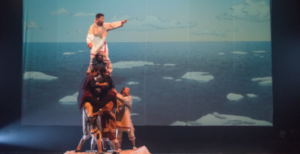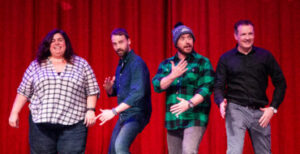 Henry and Alice Lane need a vacation. A different vacation. Usually they would venture off to Europe or somewhere exotic but Henry wants to try something else, something “new”. Unfortunately for Alice this means camping. She’s none too pleased but she’s willing to give it a try and make the most of it for Henry’s sake.
Michele Riml’s sequel to Sexy Laundry offers a glimpse at married life, or life in general, when you hit an unexpected snag. The reason Henry wants a new (cheaper) vacation is because he has recently been laid off from the engineering firm he has worked at for nearly 30 years. Right now, he wants to be closer to nature or closer to something “real” because in actuality he is still reeling from being fired from his job, not laid off. Alice wants things to remain normal and continues to spend their money like Henry is still receiving a steady paycheque. Enter camping and enter Diana, Alice’s free-spirit sister. Diana’s lifestyle demonstrates one that Alice was never brave enough to have. It’s not that Alice necessarily wants that lifestyle, but she sees her sister’s independence and wishes that financial stability wasn’t so important and maybe wishes that her life wasn’t defined so heavily by the role she took as a “housewife”.
Andrew Wheeler and Susinn McFarlen work well together. Not only are they believable as a married couple but they are also realistic. Their body movements, their conversations, and even the pitch of their argumentative tone mirror that of most relationships, especially those one has personally experienced. The highlight of Riml’s writing is that it does not matter what age an individual is in order for them to relate to the story, it only matters that they have experienced such emotions and situations. At one point the characters decide to tell ghost stories around the campfire, Alice’s (Susinn McFarlen) mind wanders off and she starts to think of how her own personal horror story would unfold. This humorous monologue consists of an almost delusional, and much older, Alice wandering around Winner’s during a red tag sale fondling linens just so that she can remember what it was like to have such material possessions and more importantly, the money to spend on such items. While meant to be humorous it also reflects how many of us feel about the decisions we make in our lives. Not everyone’s “horror story” will be the same as Alice’s but the general idea that it is the little things we take for granted (in this case, financial freedom) could be taken away from us at any moment is what resonates with the viewer.
It’s hard to become accustomed to a frugal lifestyle, especially since they should be spending their golden years enjoying the life they made together, not worrying about money. After many conversations, fights and reconciliations between all the characters Alice reveals that “money” was never the real issue, it was just a way to deal with getting older. So, while Alice may envy Diana’s free-spirit lifestyle, Diana may envy Alice’s family life and Henry may envy anyone still able to monetarily provide for their family, the real issue is one’s current position in life and do they wish they could have changed something, anything. Fading out the final scene with Henry and Alice dancing to the Rolling Stones’ “You Can’t Always Get What you Want”, which is being blasted by a neighbouring noisy camper, the audience understands that no, you can’t always get what you want but maybe what you want is not necessarily what you need.
Photo by Emily Cooper.
Henry and Alice Lane need a vacation. A different vacation. Usually they would venture off to Europe or somewhere exotic but Henry wants to try something else, something “new”. Unfortunately for Alice this means camping. She’s none too pleased but she’s willing to give it a try and make the most of it for Henry’s sake.
Michele Riml’s sequel to Sexy Laundry offers a glimpse at married life, or life in general, when you hit an unexpected snag. The reason Henry wants a new (cheaper) vacation is because he has recently been laid off from the engineering firm he has worked at for nearly 30 years. Right now, he wants to be closer to nature or closer to something “real” because in actuality he is still reeling from being fired from his job, not laid off. Alice wants things to remain normal and continues to spend their money like Henry is still receiving a steady paycheque. Enter camping and enter Diana, Alice’s free-spirit sister. Diana’s lifestyle demonstrates one that Alice was never brave enough to have. It’s not that Alice necessarily wants that lifestyle, but she sees her sister’s independence and wishes that financial stability wasn’t so important and maybe wishes that her life wasn’t defined so heavily by the role she took as a “housewife”.
Andrew Wheeler and Susinn McFarlen work well together. Not only are they believable as a married couple but they are also realistic. Their body movements, their conversations, and even the pitch of their argumentative tone mirror that of most relationships, especially those one has personally experienced. The highlight of Riml’s writing is that it does not matter what age an individual is in order for them to relate to the story, it only matters that they have experienced such emotions and situations. At one point the characters decide to tell ghost stories around the campfire, Alice’s (Susinn McFarlen) mind wanders off and she starts to think of how her own personal horror story would unfold. This humorous monologue consists of an almost delusional, and much older, Alice wandering around Winner’s during a red tag sale fondling linens just so that she can remember what it was like to have such material possessions and more importantly, the money to spend on such items. While meant to be humorous it also reflects how many of us feel about the decisions we make in our lives. Not everyone’s “horror story” will be the same as Alice’s but the general idea that it is the little things we take for granted (in this case, financial freedom) could be taken away from us at any moment is what resonates with the viewer.
It’s hard to become accustomed to a frugal lifestyle, especially since they should be spending their golden years enjoying the life they made together, not worrying about money. After many conversations, fights and reconciliations between all the characters Alice reveals that “money” was never the real issue, it was just a way to deal with getting older. So, while Alice may envy Diana’s free-spirit lifestyle, Diana may envy Alice’s family life and Henry may envy anyone still able to monetarily provide for their family, the real issue is one’s current position in life and do they wish they could have changed something, anything. Fading out the final scene with Henry and Alice dancing to the Rolling Stones’ “You Can’t Always Get What you Want”, which is being blasted by a neighbouring noisy camper, the audience understands that no, you can’t always get what you want but maybe what you want is not necessarily what you need.
Photo by Emily Cooper. 








